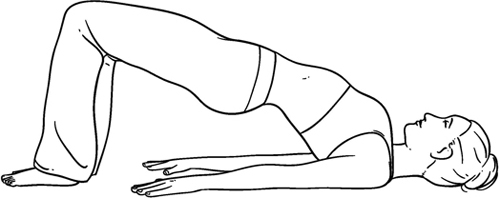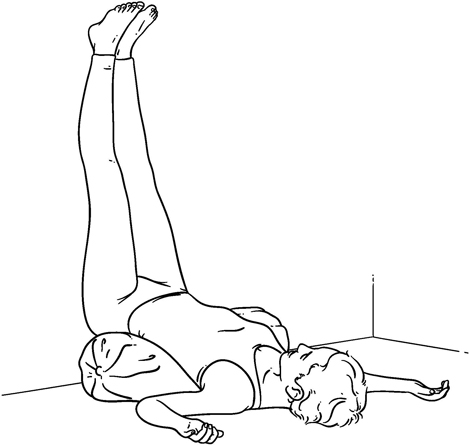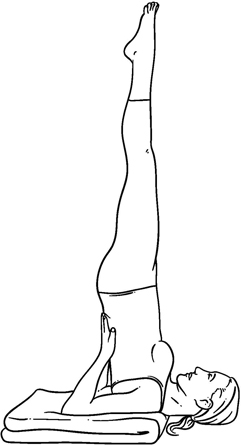CHAPTER 18
Complementary Therapy
There has been a lot of focus recently on doing things as naturally as possible and on using alternative therapies as a means of treatment. Complementary medicine is a great way to boost your natural fertility and can sometimes even help make your infertility treatment more productive. Be wary of unrealistic claims though; if it seems too good to be true, it probably is. Read on for more information about the different alternative therapies and how to determine what's right for you.
Acupuncture
There have been quite a few studies that looked at the effectiveness of acupuncture in making IVF more likely to work. Some preliminary research has shown a very slight increase in pregnancy rates in women who underwent acupuncture with their IVF cycle as compared to women who did not. Much more research is needed before a definite link can be established between acupuncture and successful fertility treatment.
What Is Acupuncture?
Acupuncture uses small needles that are placed into various points in the body to regulate the way your body functions. Reproductive acupuncturists seek to manipulate your uterine lining and ovarian function in order to optimize your body for pregnancy. The belief is that regular treatment can help increase blood flow to the uterus and ovaries, which is known to help thicken and enrich the endometrium.

Sometimes your doctor will allow the acupuncturist to give you a treatment in the clinic before and/or after your embryo transfer or insemination. A treatment right at that crucial time can help direct blood flow to the uterus and encourage implantation. If not, make alternative arrangements with your acupuncturist.
You should start your acupuncture treatment at least a few weeks before you begin your fertility treatment, or before you begin trying to get pregnant. Your practitioner will put together a protocol for you, but treatment once a week is common. Whatever your treatment plan is, speak with her ahead of time so that you know what to expect throughout your cycle.
Who Can Benefit from Acupuncture?
Keep in mind that acupuncture will not treat major structural disorders like endometriosis or pelvic adhesions. Those are only treated by medical or surgical therapies. However, the acupuncture can help boost blood flow and healing, and might even be able to reduce your pain. Some women have reported a more regular menstrual cycle and less cramping. The good news is that acupuncture is not contraindicated for anybody, or any medical condition, and it certainly will not negatively impact your cycle.
Are There Risks?
Acupuncture does involve placing small needles all over the body. While the risk is small, the needles used can cause or even transmit infection if not disposed of in between patients. For that reason, you must make sure that your practitioner is at least licensed and board certified. There are many acupuncturists who choose to specialize in reproductive issues, and you should find someone who has experience in treating infertility. Check with your clinic to see if they have any recommendations. There may be someone they work with regularly.
Herbals
The use of herbal products has exploded in recent decades, so these therapies are readily available in most locations. Many people have returned to using herbs and herbal medications for a variety of reasons.
Using Caution
Some herbs are said to have properties that aid in conception. They may or may not help you in your quest to conceive.

Many herbal products can interact with medications you are taking. Be sure to tell your practitioner about any herbal products that you are using, no matter what the purpose is for the herbal product. This can prevent potential complications for your health down the line.
Herbs and herbals are not held to the same high and strict standards of medications, so you should proceed with caution. The use of herbs should be discussed and carefully monitored by an herbal practitioner. Use your phone book or look online to find someone who specializes and has had advanced training in their use. Often health food stores will have contact information for these practitioners as well. By consulting someone who is trained in the use of herbal medications, you can be sure you're using the specific type and amount that is the best for you.
Meeting with an herbal practitioner is usually a good idea. This meeting will consist of a screening for health problems and discussion about your current condition, medications you are taking, and what you intend to achieve. The herbal practitioner can then help you find products that could assist you in conception.
Useful Herbs
Red clover is a plant that is said to aid in preparing the body for conception. It is usually recommended in tea form — the plant and capsule forms do not prepare the body in the same manner. This is used to help cleanse the uterus and reproductive tract. For fertility uses, the blossom of the red clover is usually prepared from dry form as an infusion or tea. Susun Weed, a well-known herbalist, recommends taking a cup of dried blossoms and steeping them in a quart of boiling water for at least four hours, but preferably overnight. You can drink this infusion, serving size one cup, up to four times a day. To make this infusion a bit tastier, try adding a teaspoon of dried peppermint. Remember, herbs are not a quick fix; they can take months to aid you on your road to conception.
Red raspberry leaf tea is also said to be a uterine tonic. This means that it can potentially tone your uterus for and during pregnancy. The belief is that if your uterus is “fit” then you are more likely to conceive. You can purchase premade teas and tea bags of red raspberry for this purpose. Or, you can make your own by boiling water and adding the leaves to steep for about an hour. Again, add some taste to this concoction by adding peppermint.
Herbs to Avoid
There is a list of things that should be completely avoided in the preconception period. Many of the herbs that are commonly used are known to cause late periods or have a history of being used to actually prevent conception. Here is a small list of some of the herbs to avoid while trying to get pregnant:
St. John's Wort
Dong Quai
Wild carrot (Queen Anne's lace)
Blessed thistle
Parsley seeds
Stinging nettle
Dill seeds
Wild yam
Caraway seeds
Oatstraw
Celery seeds
Pennyroyal
Cumin seeds
Avoiding these herbs and products made with them is a good idea. When in doubt, ask your practitioner or herbalist about the safety of a particular herb.
Your Weight
More and more studies are showing how important it is to be at a healthy weight before you try to conceive. Being severely over-or underweight can affect the balance of hormones in the body because fat cells can produce estrogen. Too much fat, and your body has an abundance of estrogen. Too few fat cells, and your body can be missing vital supplies of estrogen. In either case, your fertility can or will be affected.
Make sure that you incorporate lots of fruits, vegetables, and whole grains into your diet. You should also take a multivitamin to guarantee that you are getting all of the essential vitamins and minerals that you need. Try incorporating a little extra activity into your life. Go for a walk each day, try some muscle building activities; even yoga has been shown to have a beneficial effect on your fertility, as you'll see later in this chapter.
Nobody has said that giving up the foods you love and adding in more exercise is easy or fun. And your doctor certainly isn't being mean when he tells you to lose weight. But if there's one thing that you can do to help boost your health and fertility, this could be it. Isn't it worth it to have a healthy pregnancy and baby?

It may be tempting to go on a crash diet right before your cycle so that you can lose lots of weight somewhat quickly, but this is not a healthy thing to do. You're likely to put the weight back on, and possibly even more than what you lost.
Yoga
People have been practicing yoga for thousands of years. Advocates point to the many benefits that regular practice can have. This is a great way to help you deal with stress and find balance, strength, and even confidence. Physically, it can help build muscle and reduce tension, and some experts even say that working through certain positions can help boost your fertility!
Yoga for Fertility
Yoga will not cure the underlying cause for your infertility, especially conditions like endometriosis, pelvic adhesions or scar tissue, and uterine fibroids. However, when used in conjunction with traditional infertility treatment, it can help boost blood flow to the pelvis and reproductive organs.

It can be helpful to take a class with a certified yoga instructor. A great yoga instructor can really help you get started and give you further advice about positions that can boost your fertility. She'll also make sure that you are progressing through the poses appropriately.
Many women who perform yoga on a regular basis report feeling more connected to their body and more at peace emotionally. Yoga also enhances a feeling of well-being, which can carry over into the rest of your life, encouraging you to make healthier choices in your diet and activity.
Yoga Positions
The following positions have been shown to benefit your fertility. Try incorporating these poses into your regular practice.
Bridge Pose

Setu Bandha Sarvangasana pose (Bridge pose)
Lie on your back with your knees bent and your heels as close to your buttocks as possible. You can place a small towel under your shoulders to support your neck. Gently lift your hips and buttocks until your thighs are nearly parallel with the floor. Keep your knees over your feet, but push them gently away, opening up your hips. Hold for thirty to sixty seconds and then slowly roll your spine back down into a lying down position. This pose works directly on the uterus and can help relax other reproductive organs in the pelvis and lower abdomen.
Legs Up the Wall Pose

Viparita Karani Pose (Legs up the Wall pose)
Place a few folded towels about six inches from the wall. Sit on the edge of the support and in one swift motion, swing your legs up and against the wall. Your buttocks should shift off of the support and settle between the towel and the wall. You may need to experiment with your support (how high it is and how far from the wall it is) until you find what works for you. You can place a small rolled towel under your neck if it is more comfortable for you. Hold this pose for five to fifteen minutes. This pose can help relax your abdominal muscles and calm your mind.
Corpse Pose

Savasana (Corpse pose)
Lie on your back with your legs and arms stretched out and equally distant from the center of the body. Keep your hands and feet soft, with the palms turned up and your feet falling to the side. You can place a small towel under your head and neck for extra support if you need. Try to relax every muscle and organ in your body and quiet the mind. Stay in this pose for about five minutes. To leave, slowly roll onto your right side and stay for a few breaths, then slowly sit up, dragging your head behind you. This pose calms the mind and can help reduce stress.
Bound Angle Pose

Baddha Konasana (Bound Angle pose)
Sit on the floor or towel with your legs stretched out straight in front of you. Gently pull your heels in toward your groin as close as is comfortable for you. Hold your big toes with your first two fingers and thumb. Sit so that your perineum is parallel to the floor and lightly stretch the front of your body through the top of your chest. Open your thighs so your knees fall softly to the floor; never force them. Stay in this pose for one to five minutes. This pose stretches and strengthens the pelvis and reproductive organs in the lower abdomen. It also helps relieve depression and anxiety.
Supported Shoulderstand Pose

Salamba Sarvangasana (Supported Shoulderstand pose)
This is considered to be an intermediate to advanced pose and should only be attempted with an instructor who can help you get into the proper position. Fold two to three blankets and place them on the floor. Lie on your back so that your shoulders are supported on the blankets and your head is on the floor. Your legs should be stretched out. Gently bend your knees and roll your hips so that your knees come in toward your chest.

Because this pose can be tricky for a beginner, you should check out www.yogajournal.com/poses/480 for more information on getting in and out of this pose, especially if you are not used to regular yoga practice.
As you lift your pelvis off the floor, bend your elbows and turn your arms so that your hands can support your back. Keep your thumbs pointed toward your face. Your thighs should now be parallel to the floor with your knees bent and your feet hanging over your buttocks. Breathe in and push your heels toward the ceilings, then point your toes upwards. Stay in this pose for about thirty seconds, especially as a beginner. You can lengthen the amount of time you are in this pose as you become more experienced. This pose helps relax the abdominal organs and is especially helpful in treating infertility.
Relieving Your Stress
Stress can kill your fertility. Whether you are in the beginning of your journey toward parenthood, or have been trying for many years, finding ways to manage your stress is crucial to boosting your fertility. Stress isn't just bad for your emotional health, but can cause persistently elevated levels of other hormones, like cortisol and epinephrine, which may play a role. It's also thought that reducing your stress can help the uterus express proteins that are necessary for implantation.
Multiple studies have shown the benefits of stress reduction before and while trying for pregnancy. They've shown that couples are more likely to get pregnant when they are happy and relaxed and less likely when they are feeling anxious.
Stress While Undergoing Infertility Treatment
Infertility treatment is a stressful experience on its own. Unfamiliar procedures, nightly injections, possible surgery … all of these have the potential to induce a tremendous amount of stress on anyone. Many couples go into credit card debt, take out loans, or lose a big chunk of their savings, which can also contribute to a couple's stress. Add in the uncertainty of whether it will all work in the end, and no wonder that women report being extremely tense before and during treatment.
The tension that you are experiencing while undergoing infertility treatment is to be expected and completely normal, but it's important that you find ways to manage it as you move into treatment.

If you're able, take a small vacation before you start so that you are in a calm and relaxed state of mind. It doesn't have to be an elaborate two-week extravaganza, but taking a long weekend to get away and reconnect with your partner is important.
Take advantage of your reproductive psychologist or social worker and solicit her advice for specific tips that she has found to be effective. It can also be helpful to delay cycling until work and your personal obligations have calmed down a bit. Make treatment your primary focus and make sure that you are able to dedicate the amount of time necessary. Facing treatment on top of your busy season at work can easily cause you to feel out of control.
Stress Reduction
Finding ways to manage your stress is an absolute must when trying to get pregnant. It is one of the best ways that you can increase your chances of getting pregnant, both naturally and with treatment. There are lots of things you can do to help cut down on your stress. First, reduce your unnecessary obligations. Don't feel like you have to take on extra projects or favors for others; learn the value of saying “no.” A simple “I'm sorry, but it's really not a great time for me to _____” will usually get the point across.
It's very important to find time for yourself too. Schedule a workout, a movie with friends, or even a regular massage. Find something to look forward to, and schedule it regularly! After all, you'll want your body happy, calm, and relaxed for your pregnancy, right? Well, now is the time to start!
Evaluating the Effectiveness of Alternative Treatments
Spend some time on the Internet and you'll likely come across a multitude of ads and websites promising the next best herbal supplement or technique for guaranteeing a pregnancy. Unfortunately, there is nothing you can do that will guarantee that pregnancy will result. That bears repeating — there is nothing that you can do to guarantee that you will conceive. So, be wary of anyone who promises you otherwise. Yes, there are steps that you can take to help your body prepare for a pregnancy and increase your own natural fertility. But that is a very different claim than a guarantee of success.
When doing research online, make sure to check out reputable sites and sites that have been medically reviewed. Anybody can post anything online; it's not all accurate. Stick with well-known sites and sites that are in compliance with the Health on the Net Foundation's HONcode standard for trust-worthy health information. In order to receive and maintain this designation, a website must demonstrate their commitment to publishing only medically accurate information. And as always, talk to your doctor or nurse before you try anything. Even all-natural and herbal supplements can be bad for pregnancy or your health, so you should double check before taking anything.